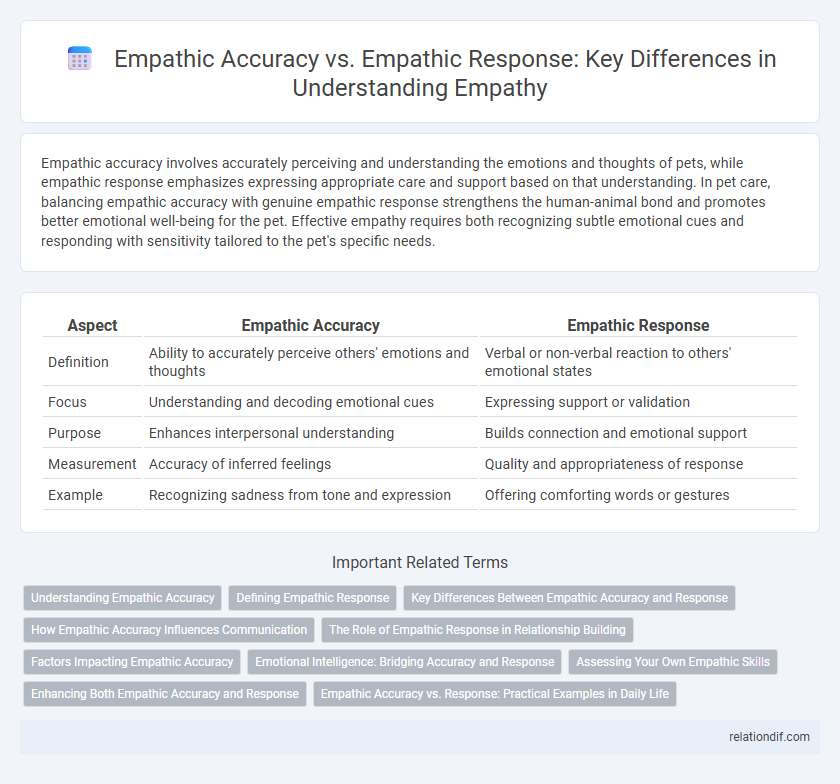Empathic accuracy involves accurately perceiving and understanding the emotions and thoughts of pets, while empathic response emphasizes expressing appropriate care and support based on that understanding. In pet care, balancing empathic accuracy with genuine empathic response strengthens the human-animal bond and promotes better emotional well-being for the pet. Effective empathy requires both recognizing subtle emotional cues and responding with sensitivity tailored to the pet's specific needs.
Table of Comparison
| Aspect | Empathic Accuracy | Empathic Response |
|---|---|---|
| Definition | Ability to accurately perceive others' emotions and thoughts | Verbal or non-verbal reaction to others' emotional states |
| Focus | Understanding and decoding emotional cues | Expressing support or validation |
| Purpose | Enhances interpersonal understanding | Builds connection and emotional support |
| Measurement | Accuracy of inferred feelings | Quality and appropriateness of response |
| Example | Recognizing sadness from tone and expression | Offering comforting words or gestures |
Understanding Empathic Accuracy
Empathic accuracy refers to the ability to accurately infer another person's thoughts and feelings, which is crucial for effective interpersonal communication. This cognitive skill involves decoding verbal and nonverbal cues to understand emotions and perspectives with precision. Enhanced empathic accuracy fosters deeper emotional connections and improves conflict resolution by aligning responses with others' true experiences.
Defining Empathic Response
Empathic response refers to the verbal and nonverbal actions expressing understanding, compassion, and support toward another person's emotional state. Unlike empathic accuracy, which involves correctly identifying and interpreting another's feelings, empathic response emphasizes the active communication of empathy to nurture connection and trust. Effective empathic responses can foster emotional healing and strengthen interpersonal relationships by validating and addressing the needs of others.
Key Differences Between Empathic Accuracy and Response
Empathic accuracy refers to the ability to correctly identify and understand another person's emotions and thoughts, often measured by objective assessment of perception. In contrast, empathic response involves the emotional and behavioral reactions aimed at providing support or comfort based on that understanding. The key difference lies in empathic accuracy emphasizing cognitive insight, while empathic response centers on affective engagement and interpersonal communication.
How Empathic Accuracy Influences Communication
Empathic accuracy significantly enhances communication by allowing individuals to precisely understand others' thoughts and emotions, reducing misunderstandings and fostering deeper connections. Accurate perception of nonverbal cues and emotional states enables tailored responses that resonate more effectively with the speaker's needs. This heightened awareness promotes trust and openness, facilitating more meaningful and constructive interpersonal exchanges.
The Role of Empathic Response in Relationship Building
Empathic response plays a critical role in relationship building by demonstrating understanding and validation of another person's feelings, which fosters trust and emotional connection. Unlike empathic accuracy, which involves correctly perceiving another's emotions, empathic response actively communicates support and care, strengthening relational bonds. Research indicates that consistent empathic responses enhance intimacy and cooperation, making them essential for healthy interpersonal dynamics.
Factors Impacting Empathic Accuracy
Empathic accuracy, the ability to accurately perceive others' emotions, is influenced by factors such as cognitive capacity, emotional intelligence, and situational context. Individual differences like empathy motivation and cultural background also significantly shape empathic accuracy. In contrast, empathic response focuses more on the quality of emotional support provided rather than the precision of emotional understanding.
Emotional Intelligence: Bridging Accuracy and Response
Empathic accuracy involves accurately perceiving another person's emotions, which forms the foundation of emotional intelligence. Effective empathic response requires not only understanding these emotions but also appropriately addressing them to foster connection and support. Emotional intelligence bridges the gap by integrating precise emotional insight with compassionate, tailored reactions that enhance interpersonal relationships.
Assessing Your Own Empathic Skills
Assessing your own empathic skills involves distinguishing between empathic accuracy, the ability to accurately perceive others' emotions, and empathic response, the capacity to appropriately react to those emotions. Enhancing empathic accuracy requires attentive observation and active listening, which improve understanding of subtle emotional cues. Developing a strong empathic response depends on emotional regulation and expressing genuine concern, promoting effective emotional support in interpersonal interactions.
Enhancing Both Empathic Accuracy and Response
Enhancing empathic accuracy requires practicing active listening and attentively observing verbal and nonverbal cues to accurately understand another person's emotions and intentions. Improving empathic response involves expressing validation and support through compassionate communication that reflects genuine concern. Balancing both accuracy and response fosters deeper interpersonal connections and effective emotional support.
Empathic Accuracy vs. Response: Practical Examples in Daily Life
Empathic accuracy involves precisely understanding another person's thoughts and feelings, such as accurately recognizing a colleague's stress during a meeting by observing nonverbal cues. In contrast, empathic response refers to the way one expresses understanding and support, like offering comforting words or assistance when a friend shares a personal struggle. Practical application in daily life includes sensing a partner's frustration through tone and body language (accuracy) and responding with patience or helpful suggestions (response) to strengthen relationships.
empathic accuracy vs empathic response Infographic

 relationdif.com
relationdif.com